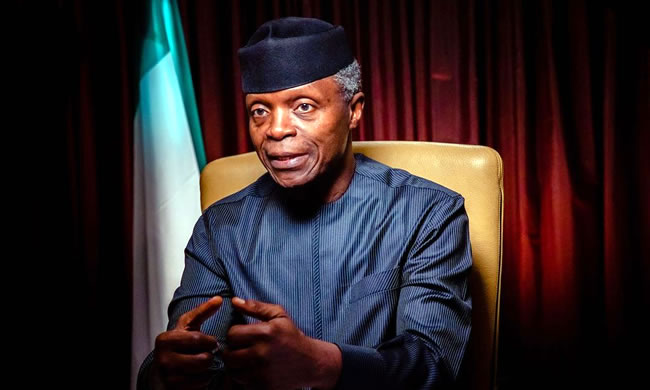Vice President Yemi Osinbajo has called on the ECOWAS region to be conscious of the growing population of its young people and the need to provide quality healthcare, education and nutrition to them.
Osinbajo made this submission at the presentation of the Strategy Documents of the Human Capital Development Programmes for ECOWAS and Nigeria organised by the National Economic Council (NEC) on Thursday in Abuja.
According to him, Africa is the youngest and fastest-growing continent as West Africa is projected to have 400 million young people by 2050.
Osinbajo said that the essence of the documents was to buttress that the people were central to all that governments and their private sector or civil society partners did.
“The most important pieces of work that we can do are on planning and investing in human capital development, healthcare, nutrition, quality education, skills, and jobs.
“Our most important targets and objectives nationally and regionally must be on the improvement of the quality of lives, living standards and livelihoods of our people—the happiness, security and general welfare of our populations; nothing else is as important.
“Now, we have our strategy documents; but we are in a race against time; locked in a mortal battle with difficult local and global macroeconomic and fiscal circumstances even as states, and regions face deadly civil conflicts and terrorism.
“Our continent, which is the youngest and growing at double the rate of the rest of the world, the youngest country, Niger, is in our sub-region with an average age of 15.4 years.
“By 2050, West Africa will have 650 million people; almost 400m will be young people; and we must provide quality basic education and healthcare for them, nutrition.’’
Osinbajo said that inadequate nourishment results in suboptimal learning outcomes and a lifetime of disadvantage, especially in what was becoming a fiercely competitive Knowledge economy.
He warned that an idle, youthful population portended an increased risk of social instability.
“We must invest in relevant skills as we provide good paying jobs and opportunities.
“All these mean that our governments face huge public expenditures, growing as population increases daily.
“But in these massive challenges also lie the incredible opportunities of being the most profitable investment frontier in the world, of becoming the global food basket, of becoming the greatest source of highly trained human resources in technology, engineering, sciences and in the creative sector among others.
“But all these great hopes and aspirations stand or fall around governments and governance; it is the commitment of national and sub-national leaders that will determine whether these strategy documents will gather dust or gather momentum.”
He said that political will and action was what stood between rising poverty and misery of the people.
The vice president said that on the one hand, good governance, judicious and effective use of scarce resources was the thin line between demographic dividends and a demographic disaster.
He said that that the Federal Government and NEC had made good strides in addressing issue of Human Capital Development (HCD).
Osinbajo said that in 2018, the president initiated the National Human Capital Development Programme and tasked NEC to address the critical issues of citizens’ well being holistically and in an enduring manner.
He said that NEC, then, set up the HCD Steering Committee as well as the Core Working Group on Human Capital Development.
“The President, in 2018, initiated the National Human Capital Development Programme charging NEC with the task of addressing the critical issues of citizens’ well being holistically and in an enduring manner.
“NEC then set up the HCD Steering Committee as well as the Core Working Group on Human Capital Development,’’ he said.
In her speech, the Vice President of the ECOWAS Commission, Finda Koroma, said that the demographic transition in West Africa, resulting from rising population, would bring with it, social risks and opportunities.
She said that the opportunities should be maximised to achieve demographic dividends.
The event attracted representatives from ECOWAS Member States, traditional rulers, members of the diplomatic corps, state governors, development partners among others.
